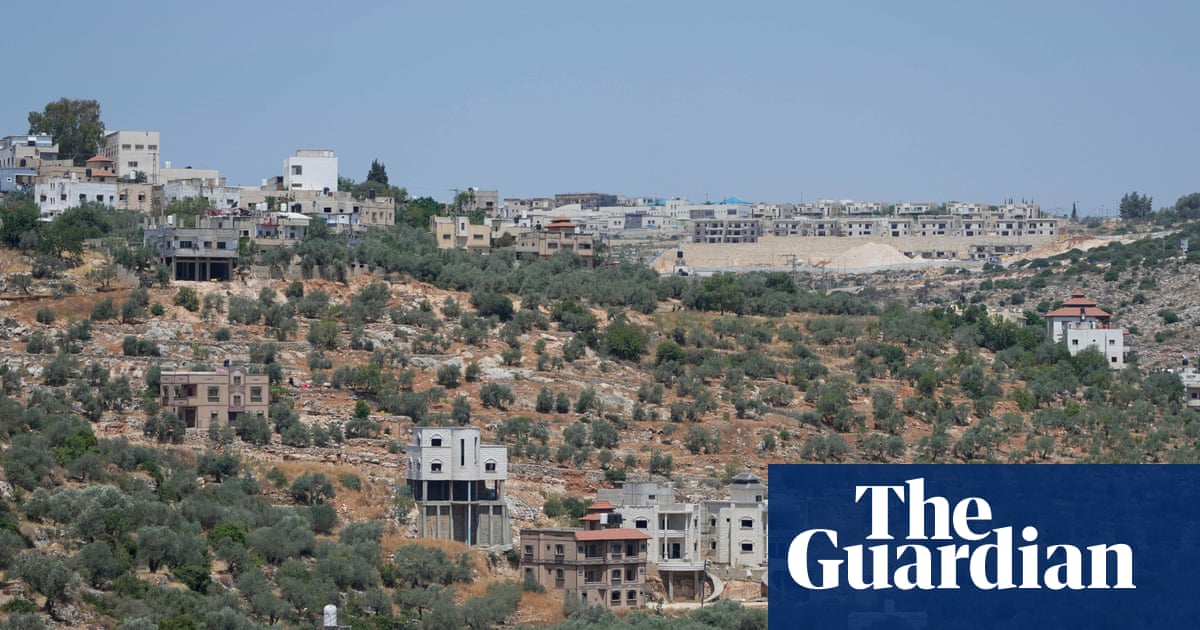Israel has said it will establish 22 new settlements in the occupiedWest Bank, including the legalisation of outposts already built without government authorisation, after a security cabinet vote held in secret last week.
Israel occupied the West Bank, capturing it from Jordan, in the six-day war of 1967. Since then, successive governments have tried to permanently cement Israelicontrol over the land, in part by declaring swathes as “state lands”, which prevents private Palestinian ownership.
The motion was said to have been put forward by the far-right defence minister,IsraelKatz, and finance minister, Bezalel Smotrich, who lives in the West Bank settlement of Kedumim, which is considered illegal under international law.
Katz said the settlement decision “strengthens our hold on Judea and Samaria”, using the biblical term for the West Bank, “anchors our historical right in the Land of Israel, and constitutes a crushing response to Palestinian terrorism”.He added it was also “a strategic move that prevents the establishment of a Palestinian state that would endanger Israel”.
The government intends to use the 22 settlements to bolster Israel’s presence around Route 443, which connects Jerusalem and Tel Aviv via Modiin and was described by Israel Ganz, the head of the Yesha council umbrella group of West Bank Jewish municipalities, as “the most important decision since 1967”.
The minister said on X: “We have made a historic decision for the development of settlements: 22 new communities in Judea and Samaria, renewing the settlement of the north of Samaria, and reinforcing the eastern axis of the State of Israel.”
Last July Israel approved the largest seizure of land in the occupied West Bank in more than three decades, accordingto a report releasedby Peace Now, an Israeli anti-settlement watchdog.
At the time, the Israeli government approved the appropriation of 12.7 sq km (nearly 5 sq miles) of land in the Jordan valley, indicating it was “the largest single appropriation approved since the1993 Oslo accords”, referring to the start of the peace process.
In aleaked recording captured by Peace Now last year,Smotrich, during a conference for his National Religious Party-Religious Zionism, disclosed that the land confiscations in 2024 surpassed previous years’ averages by approximately tenfold.
He said: “This thing is mega-strategic and we are investing a lot in it. “This is something that will change the map dramatically.”
In May 2023, Smotrich, who said his “life’s mission is to thwart the establishment of a Palestinian state”, instructed Israeli government ministries toprepare for a further 500,000 Israeli settlersto move into the occupied West Bank.
On 20 June,the Guardian revealedhow the Israeli military had quietly handed over significant legal powers in the West Bank to pro-settler civil servants working for Smotrich.
An order posted by the Israel Defense Forces on its website on May 2024 transfers responsibility for dozens of bylaws at the Civil Administration – the Israeli body governing in the West Bank – from the military to officials led by Smotrich at the defence ministry.
In March, instatement issuedby Peace Now said that between 1 January and 19 March this year, 10,503 housing units were promoted, surpassing the 9,971 units approved throughout the whole of 2024.
The approval of new settlements by Benjamin Netanyahu’s far-right government represents a further implementation of its longstanding goal to annex the occupied Palestinian territory – an objective bolstered by the Trump administration.
Mike Huckabee,nominated as Trump’s new ambassador to Israel, signalled his support for Israeli claims on the West Bank in an interview last year. He said: “When people use the term ‘occupied’, I say: ‘Yes, Israel is occupying the land, but it’s the occupation of a land that God gave them 3,500 years ago. It is their land.’”
Rightwing settlers have described top officials Trump’s new administration, which rescinded sanctions imposed on violent Israeli settler groups, as a “dream team” that will offer a“special opportunity”to permanently end any prospect of a Palestinian state.
Associated Press contributed to this report
